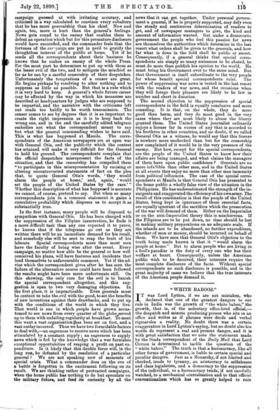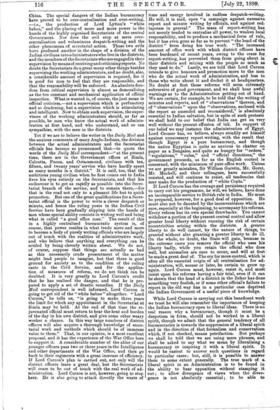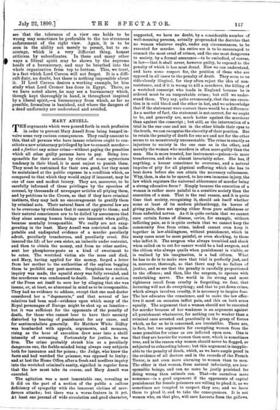"WHITE BABOOS."
IT was Lord Lytton, if we are not mistaken, who declared that one of the greatest dangers to our rule in India was the growth of "the white baboo," the growth, that is, of the sedentary office-bred official,— the despatch and minute producing person who sits in an office and writes as if phrases were deeds and verbal rigmaroles a reality. No doubt there was a certain exaggeration in Lord Lytton's saying, but no doubt also his words do represent a real and present danger, and it is with great satisfaction that we note the statement made by the Simla correspondent of the Daily Mail that Lord Curzon is determined to tackle the question of the "white baboo." The truth is that a bureaucracy, like all other forms of government, is liable to certain special and peculiar dangers. Just as a Monarchy, if not limited and checked, tends to tyranny, an aristocracy to selfishness and class legislation, and a democracy to the suppression of the individual, so a bureaucracy tends, if not carefully watched, to a mechanical centralisation and to that official conventionalism which has so greatly helped to ruin China. The special dangers of the Indian bureaucracy have proved to be over-centralisation and over-writing, —i.e., the production of Lord Lytton's "white baboo," and the placing of more and more power in the bands of the highly organised Secretariats of the central Government. Nor does the evil stop at mere over- centralisation and voluminous despatch-writing and the other phenomena of secretarial action. Those two evils have produced another in the shape of a division of the Indian civilians into administrators who live in the districts, and the members of the Secretariats who are engagedin their supervision by means of receivin g and criticising reports. No doubt the Secretariats do a great many other things besides supervising the working administrators, and no doubt, also, a considerable amount of supervision is required, for it is good for men to feel that they are responsible, and that the responsibility will be enforced. An absolute free- dom from critical supervision is almost as demoralising as the too constant and mechanical application of official inspection. What is wanted is, of course, the just mean in official criticism,—not a supervision which is perfunctory and so deadening, but a supervision which is stimulating and intelligent. Now to obtain such supervision, the super- visors of the working administrators should, as far as possible, be men who know the actual work of adminis- tration at first band, and who understand, and so can sympathise, with the men in the districts.
Yet if we are to believe the writer in the Daily Mail and the anxious comments of many Anglo-Indians, the division between the actual administrators and the Secretariat officials has become so pronounced that—to quote the words of the Daily Mail correspondent—" at the present time, there are in the Government offices at Simla, Calcutta, Poona, and Ootacamund, civilians with ten, fifteen, and twenty years' service who have hardly spent as many months in a district." It is said, too, that the ambitious young civilian when he first comes out to India fixes his eyes entirely on the Secretariats, and that his endeavour is to get as rapidly as possible into the Secre- tariat branch of the service, and to remain there,—for that is the road not only to a pleasant life but to quick promotion. But one of the great qualifications for a Secre- tariat official is the power to write a clever despatch or minute, and hence the ruling posts in the Indian Civil Service have been gradually slipping into the hands of men whose special ability consists in writing well and being what is called "a good office man." The result of this in a highly centralised bureaucratic system is, of course, that power resides in what tends more and more to become a body of purely writing officials who are largely out of touch with the realities of administrative work, and who believe that anything and everything can be settled by being cleverly written about. We do not, of course, suppose that things are actually as bad as this necessarily crude presentment of the matter might lead people to imagine, but that there is good ground for anxiety as to the condition of the ruling caste in the Civil Service, and for the applica- tion of measures of reform, we do not think can be doubted. It is very greatly to Lord Curzon's credit that he has realised the danger, and that he is pre. pared to apply a set of drastic remedies. If the Daily Mail correspondent is well informed, Lord Curzon is going to get rid of the "white baboo " altogether. "Lord Curzon," he tells us, "is going to make three years the limit for which any appointment in the Secretariat at Simla may be held. At the end of that time the re- juvenated official must return to bear the heat and burden of the day in his own district, and give some other weary worker a chance. In this way large numbers of district officers will also acquire a thorough knowledge of secre- tarial work and methods which should be of immense value to them." That, in our opinion, is a most excellent proposal, and it has the experience of the War Office here to support it. A considerable number of the abler of our younger officers pass two or three years in the Intelligence and other departments of the War Office, and then go back to their regiments with a great increase of efficiency. If Lord Curzon's plan is carried out, not only will the district officers learn a great deal, but the Secretariats will cease to be out of touch with the real work of ad- ministration. Lord Curzon is not, however, going to stop here. He is also going to attack directly the waste of time and energy involved in endless despatch-writing. He will, it is said, open "a campaign against excessive report and minute writing by officials, and against red- tapeism in general." The mass of report-writing has not merely tended to centralise all power, to weaken local responsibility, and to produce a mechanical form of rule, but it has even gone so far as to prevent "the head of the district" from doing his true work. "The increased amount of office work with which district officers have been burdened of recent years, owing to the craze for report-writing, has prevented them from going about in their districts and mixing with the people so much as they used to do." Lastly, we are told that Lord Curzon intends to give honours and promotion more to the men who do the actual work of administration, and less to those who write about it and docket it at headquarters. No doubt at first these reforms will seem extremely subversive of good government, and we shall hear awful warnings as to the Administration getting out of hand. We are certain, for example, to be told that the writing of minutes and reports, and of " observations " thereon' and of " observations " upon the "observations, enclosed with the report as amended and reconsidered," is absolutely essential to Indian salvation, but in spite of such protests we shall hold to our belief that India can get on very well without the present effusion of ink. In support of our belief we may instance the administration of Egypt. Lord Cromer has, we believe, always steadily set himself against unnecessary report writing, with the result that though Egypt is a pure bureaucracy, and though the native Egyptian is quite as anxious to chatter on paper as a Bengalee, and quite as hungry for "orders," "regulations," "rules," and "official directions," the government proceeds, as far as the English control is concerned, with the minimum of pure office work. Unless we are greatly mistaken, Sir William G-arstin, Mr. Gorst, Mr. Machell, and their colleagues, have successfully resisted, and will continue to resist, all tendencies that may make for the production of "white Copts." If Lord Curzon has the courage and persistency required to carry out his programme, he will, we believe, have done an incomparable service to British rule in India. He must be prepared, however, for a good deal of opposition. He must also not be daunted by the inconveniences which are sure, especially at the beginning, to accompany his reforms. Every reform has its own special drawbacks. You cannot withdraw a portion of the present central control and allow greater local liberty without running the risk of certain eccentricities arising within the districts. A greater liberty to do well cannot, by the nature of things, be - granted without also granting a greater liberty to do ill. On the whole, no doubt, the State will gain, because in the extreme cases you remove the official who uses his liberty badly, while you retain the official who does well, but anomalies are sure to occur, and will at first ' be made a great deal of. The cry for more control, which is after all the essential origin of all centralisation for ad- ministration, will, sooner or later, be certain to grow up again. Lord Curzon must, however, resist it, and must insist upon his reforms having a fair trial, even if it can be shown that the head of a district in the Behar has done something very foolish, or if some other official's failure to report in the old way has in a particular case deprived the Indian Government of a useful piece of knowledge.
While Lord Curzon is carrying out this beneficent work we trust he will also remember the importance of keeping the Indian bureaucracy open to liberal ideas. There is no real reason why a bureaucracy, though it must be a despotism in form, should not be worked in a liberal spirit, though we admit that the general tendency of all bureaucracies is towards the suppression of a liberal spirit and in the direction of that formalism and conservatism which, if not checked, means petrifaction. But perhaps we shall be told that we are using mere phrases, and shall be asked to say what we mean by liberalising a bureaucracy or inspiring it with a liberal spirit. It would be easiest to answer such questions in regard to particular cases ; but, still, it is possible to answer them to some extent generally. The true mark of a liberal spirit in an Administration is to be found in the ability to bear opposition without stamping it out; to allow divergence of views when the diver- gence is not absolutely essential ; to be able to
see that the tolerance of a view one holds to be wrong may sometimes be preferable to the too strenuous enforcement of the right view. Again, it is to be seen in the ability not merely to permit, but to en- courage, which is a very different thing, honest criticism by subordinates. In these and many other ways a liberal spirit may be shown by the supreme heads of a bureaucracy, and may be breathed into the whole organisation from top to bottom. This, we trust, is a fact which Lord Curzon will not forget. It is a diffi- cult duty, no doubt, but there is nothing impossible about it. If Lord Curzon desires a working example, let him study what Lord. Cromer has done in Egypt. There, as we have noted above, he may see a bureaucracy which, though kept thoroughly in hand, is throughout inspired by a liberal spirit,—a bureaucracy from which, as far as possible, formalism is banished, and where the dangers of a dead uniformity are understood and avoided.




































 Previous page
Previous page